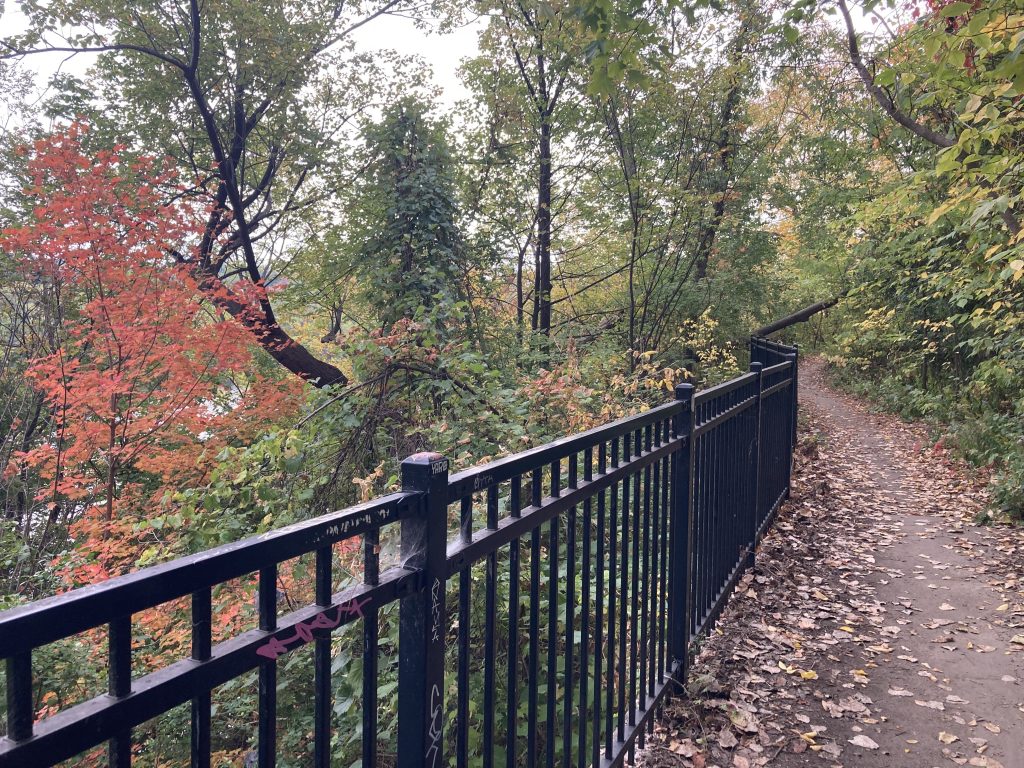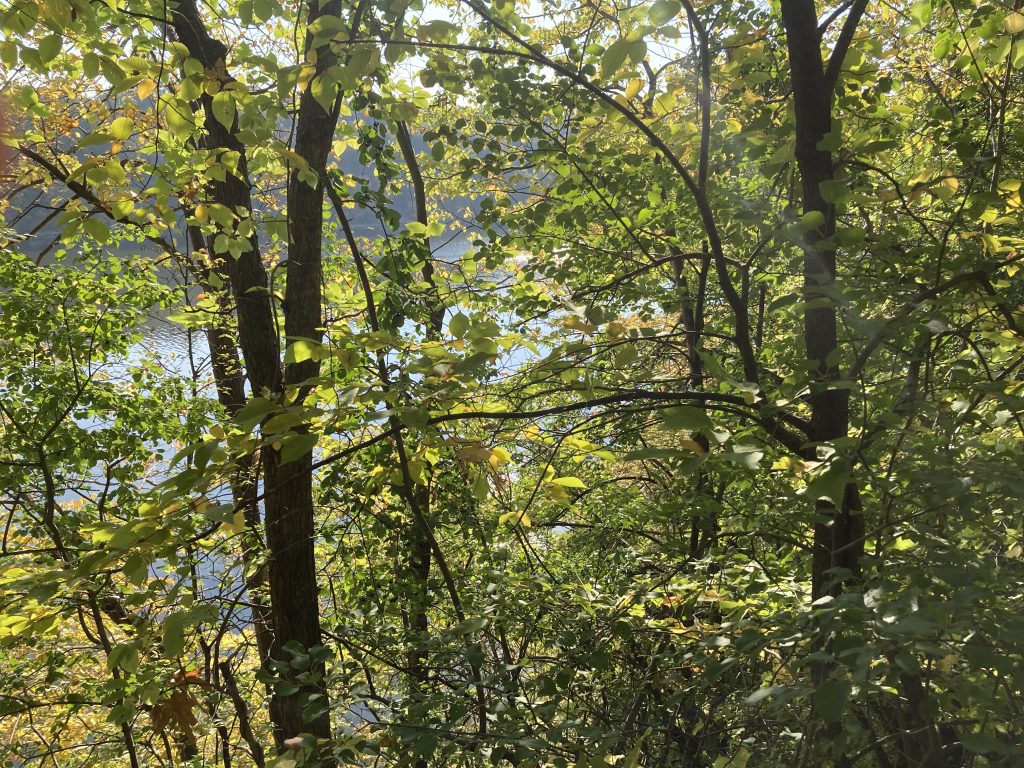3.8 miles
river road, north/south
70 degrees
Gloomy, everything looking dark and mysterious. I like these overcast mornings, especially when running beside the gorge. All the colors feel more intense — dark greens, yellows, reds, oranges. Today I saw at least 3 different versions of orange: orange leaves pale and almost pink; then orange leaves like a neon crayola; finally the classic orange — what I call orange orange — of construction cones and a sidewalk closed sign.
Greeted Dave, the Daily Walker. Smiled at a dozen walkers and runners. Forgot to try and see the river. Heard some birds (more about that below), the clicking and clacking of ski poles from a roller skier, the irritating squish of a walker’s slides. Smelled tar. Noticed that the path was covered in green leaves.
I felt relaxed and dreamy at the beginning, sweaty and a little sore at the end.
before the run
More with Forrest Gander and his circumambulation. Today, the next few stanzas of Circumambulation of Mt. Tamalpas:
as we hike upward mist holds
the butterscotch taste of Jeffrey pine
to the air until we reach a serpentine
barren, redbud lilac and open sky, a crust
of frost on low-lying clumps of manzanita
mist holds/the butterscotch taste of Jeffrey pine I rarely think about (or remember if it happened) tasting the air. What might the air taste like on my run today?
Serpentine — another word for winding or twisting? Are there any parts of my running route that are serpentine? I’ll try to pay attention.
at Redwood Creek, two
tandem runners cross
a wooden bridge over
the stream ahead of us the raspy
check check check of a scrub jay
Looked up scrub jays. Also called California scrub jays. Like the blue jays here, which are just called blue jays (at least, that’s what I found in my minimal research), they are LOUD. Here’s what the Cornell Lab writes about their sounds:
CALLS
California Scrub-Jays, like other jays, are extremely vocal. Behaviorists have described more than 20 separate types of calls for this and the closely related Woodhouse’s Scrub-Jay. Examples include a weep uttered during flight, while carrying nesting material, or while taking cover from a flying predator; a bell-like shlenk used antagonistically, a quiet kuk exchanged between mates, and loud, rasping scolds for mobbing predators.
OTHER SOUNDS
Scrub-jays often clack their bill mandibles together to make a sharp rapping. Their wings make a whooshing sound on takeoff, and they exaggerated this during altercations.
California Scrub-Jay: Sounds
Gander’s rasping check check check must be the Cornell Lab’s rasping scolds. You can also hear the delightfully irritating clicking of the bill mandibles and the exaggerated flapping of their wings.
hewing to the Dipsea path while
a plane’s slow groan diminishes bayward,
my sweat-wet shirt going cool
around my torso as another runner
goes by, his cocked arms held too high
hew = adhere, conform…a plane’s slow groan — I’ve never heard a plane as groaning. Usually I write roar or buzz — a boom? I’ll have to listen for groaning planes today.
Yesterday when I was running, and it has too hot and sticky, I checked to see if my shirt was sticking to me. Nope. Not or long enough to have that happen. Does it ever happen? I sweat a lot, but rarely to the point where my shirt is soaked and stuck. With this brief description, I know that Gander’s circumambulation has been going on for a long time and that it is really HOT.
I like Gander’s last line about the cocked arms held too high. I often give attention to walkers’ and runners’ gaits and how they hold their arms. Some small part of it might be out of judgment, but primarily it’s about: admiring moving bodies, especially graceful ones; studying them to see what doesn’t feel right — this is a way to work through my vision limitations and to determine what I am actually seeing; and as a way to identify different movers out by the gorge. I can’t see faces clearly enough to recognize people (not even my husband or my kids), so I rely on other methods, like wide arm swings (that’s how I identify the Daily Walker) or gangly legs (the long- legged walker I call Daddy Long Legs).
Okay, so during my run today if I can, I’d like to think about/notice the following:
- tasting the gorge
- looking for serpentines
- listening for blue jays and groaning planes
- noticing how and where (and if) my sweat collects
- making note of the different gaits of walkers and runners
during the run
I wasn’t sure how I would try to notice all of the things I wanted to — a taste, a twist, an irritating sound, where my sweat collects, and a distinctive gait — but as I ran, I just started collecting images. It became a game or a scavenger hunt. Here’s how I did it: First, I tried to be open to things on my list. Not searching too hard for them, but being ready if they appeared. Then I briefly stopped at the end of each mile (roughly), and recorded the images I collected — I described them on a voice memo app. I was able to collect all 5, with taste being the last to be found.
mile 1
serpentine twist: looking up, noticing the trees winding through the air, almost like a river reversed.
irritating bird: Heard the clicking of a bird and I’ve been wondering (for some time) what bird makes those clicking sounds and I think it might be the clicking of the bill mandibles of a blue jay!
mile 2
My sweat is collecting on the side of my nose. I can sometimes see it through my peripheral vision. Now it’s dripping down my cheeks.
a gait: Passed a runner with very fast cadence — short, little steps. This inspired me to pick up my cadence.
right after recording these two images, I took a picture of my view, down on the Winchell Trail at a small overlook, perched above a sewer pipe:

mile 3
taste: Bitter burnt toast coming from the tar they were using to cover the cracks near the trestle.
Bonus: a blue umbrella
A bright blue umbrella on a bench, looking strange and out of place. I noticed someone sitting next to the umbrella. I found this umbrella wonderful for the pop of color it brought to the gloomy gorge, for how unexpected it was, and for how it made me wonder about its companion: a person who likes to be prepared? who loves walking by the gorge so much that they’ll go even if it’s about to rain? who loves the rain? And, why did they leave the umbrella open — to give us all a gift of bright blue? they despise closing umbrellas? the umbrella is broken? Maybe if I was standing still, some of these questions would have been answered, but I like the mystery that moving made!
after the run
This “game” was a lot of fun, and I’d like to try doing it again. Would it work as well the next time? I’ll have to see. It made the run go by faster and helped me notice and remember things I might not have otherwise.
Also: I don’t taste a lot of things while I’m running. I should try and work on that by practicing and maybe reading more of other peoples’ words about tasting the world.
